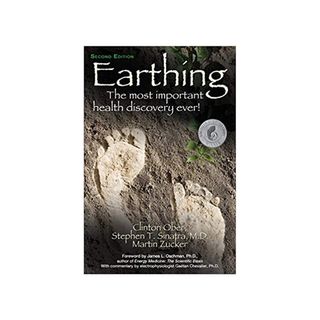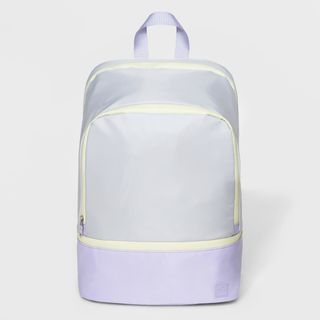Meet "Earthing," the Simple Wellness Ritual That Makes Me Happier


It probably comes as no surprise to anyone in my life that I am happiest when I am outside, sans shoes. This particularly crunchy habit was instilled in me from a very young age: My fondest childhood memories are summer weekends spent at my grandparents' lake house, where going barefoot was practically mandatory—all the better to transition from land to water and back again, and to climb all the boulders that line the property. As the temperatures began to rise each spring, my siblings and I would actually begin ditching our shoes in our own yard so that our feet would be callused in time for those glorious days by the lake.
In contrast, most of my adult years have been spent in urban environments that aren't really conducive to open-toe shoes, much less traipsing around barefoot. It wasn't until I recently moved to a new apartment with some outdoor space that I began to remember just how good connecting my feet with the ground feels.
If this all seems like some first-class hippie shit, just know that there's actually a name for this phenomenon, as well as some interesting science behind it. Earthing, also known as grounding, is the simple act of walking barefoot outside—and preliminary research suggests that it can counteract stress and anxiety, boost your mood, and even reduce inflammation.
How does it work?
To understand how earthing works, it's first important to know that our bodies actually generate electricity: You probably remember from high school biology that every cell is made of protons and electrons, and our nervous system basically communicates with those cells by sending electric currents.
The earth also carries its own complex electrical system, and when we make direct contact with it, those two systems interact with each other: The earth carries a very negative charge, and going barefoot (or touching the earth in any way) actually results in a charge exchange.
Preliminary studies show that the electrons that feed into our bodies from the earth may actually function as antioxidants: They neutralize free radicals (which are unpaired positive ions), which, when in excess, can push the body into a state of oxidative stress—something that has been connected with inflammation and many diseases such as cancer.
The current research on the impact of earthing is limited but fascinating nonetheless. One study, for example, found that a group of subjects who were "grounded" to the earth (via a specialized mattress pad) slept better, found their pain reduced, and experienced less stress, thanks to reduced cortisol levels. Another connects earthing to a better immune response.
But there are other benefits to being barefoot, too.
For one, just spending time outside and interacting with nature have been shown to be significant mood boosters, not to mention it helps regulate cortisol, our "stress" hormone.
Also, remember when those "barefoot" running shoes were all the rage? That's because research shows that walking (or running) barefoot is easier on our bones, muscles, and joints. It helps evenly distribute pressure across your feet and greatly reduce the force of impact on the ground. (Thanks to the shock-absorbing buffer of your average shoes, we tend to really slam our feet down. Going barefoot forces us to have a lighter gait—which results in more controlled movement and more muscle tone to boot.)
This isn't at all to suggest that you should start running barefoot through the streets of New York City—in fact, please don't—but should you have the opportunity to take your shoes off in sanitary (and socially acceptable) fashion, consider it good for your health.
Next up: 5 Compelling Reasons to Add Hiking to Your Fitness Routine
Disclaimer
This article is provided for informational purposes only and is not intended to be used in the place of advice of your physician or other medical professionals. You should always consult with your doctor or healthcare provider first with any health-related questions.
-
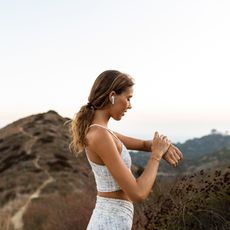 The Gear You Need for Any Outdoor Adventures This Spring
The Gear You Need for Any Outdoor Adventures This SpringHere's what to pack.
By Sarah Yang
-
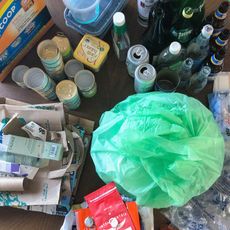 I Tried to Reduce My Trash by 50%—Here's What Happened
I Tried to Reduce My Trash by 50%—Here's What HappenedIt was challenging yet rewarding.
By Jacqueline Lee
-
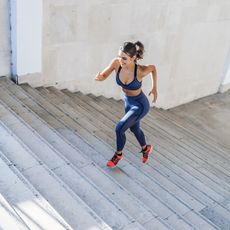 The Sustainable Activewear Brands That You Need to Know About
The Sustainable Activewear Brands That You Need to Know AboutPut these on your list.
By Sarah Yang
-
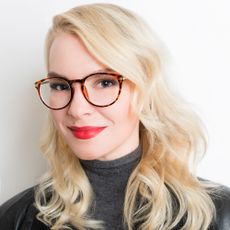 This Sustainability Activist Has a Zero-Waste Morning Routine
This Sustainability Activist Has a Zero-Waste Morning RoutineIdeas you can use for your own mornings.
By Sarah Yang
-
 25 Simple Ways You Can Be a Good Neighbor Right Now
25 Simple Ways You Can Be a Good Neighbor Right NowStart here.
By Sarah Yang
-
 9 Ways You Can Be a More Mindful Shopper
9 Ways You Can Be a More Mindful ShopperBe good to the environment (and your wallet).
By Sarah Yang
-
 The 15 Best Sustainable Gifts to Give This Holiday
The 15 Best Sustainable Gifts to Give This HolidayPresents, but make them eco-friendly.
By Sarah Yang
-
 PSA: You're Probably Recycling Wrong—Here's How to Fix It
PSA: You're Probably Recycling Wrong—Here's How to Fix ItKnow the rules.
By Sarah Yang
